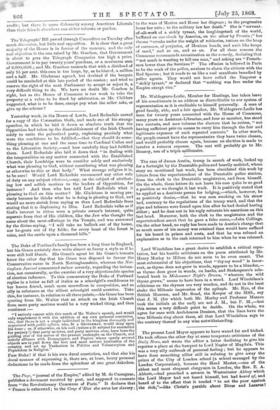Lord Winchilsea has a great desire to establish a critical
repu- tation, but his hostile criticisms on the poem attributed by Mr. Henry Morley to Milton do not seem to be even smart. The most substantial of his objections, that "thy my wood" is incor- rect, as thyme does not grow in woods, appears to be a blunder,— as thyme does grow in woods, on banks, and Shakespeare's cele- brated bank in Midsummer Night's Dream, " whereon the wild thyme grows," seems to have been in a wood. Lord Winchilsea's criticisms on the rhymes are very wooden, and do not in the least shake the Miltonic impression of the epitaph. Mr. Rye, of the British Museum, and Mr. Bond, the Keeper of the MSS., say that J. M. (for which both Mr. Morley and Professor Masson took the initials at the end) are not J. M., but P. M.,—but this seems a very difficult point to decide. On the whole, we agree for once with Archdeacon Denison, that the lines have the true Miltonic ring about them, all that Lord Winchilsea says to the contrary thereof in any wise notwithstanding.






























 Previous page
Previous page